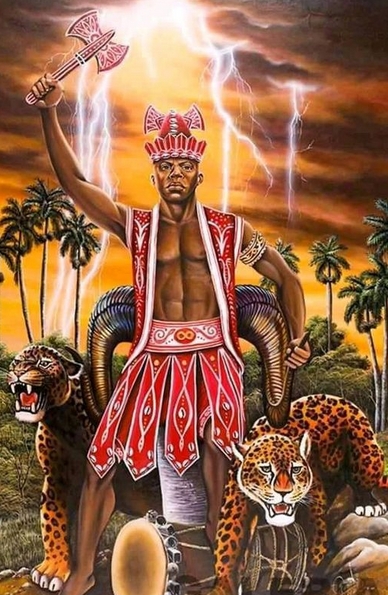
support@yorubalibrary.com
+2348073529208, 07038599574

Yoruba culture is renowned for its unique traditional festivals that celebrate deities, history, and community values. One of the most significant festivals is the Sango Festival, dedicated to Sango, the god of thunder and lightning. This article showcases the origins, rituals, and significance of the Sango Festival in Yoruba culture.
Origins of the Sango Festival
The Sango Festival traces its roots to ancient Yoruba history and mythology. Sango, also known as Shango, Xango or Jakuta, was a powerful king of the Oyo Empire who was later deified as the god of thunder and lightning. His legendary reign and supernatural abilities have made him a central figure in Yoruba spirituality.
Rituals and Celebrations
The Sango Festival is marked by a series of elaborate rituals and celebrations that reflect the deep spiritual and cultural significance of Sango.
Opening Ceremonies
The festival typically begins with a grand opening ceremony, featuring traditional drumming, dancing, and prayers. Devotees gather at the Sango shrine to offer sacrifices and invoke the presence of the deity.
Processions and Displays
One of the highlights of the Sango Festival is the vibrant procession through the streets. Participants, adorned in traditional attire, carry effigies of Sango and perform energetic dances to the rhythm of the bata drums. The procession often includes displays of fire-eating and acrobatics, symbolizing Sango's fiery nature.
Sacred Rituals
Various sacred rituals are performed throughout the festival to honor Sango. These rituals include the offering of kola nuts, palm wine, and other sacrificial items. Priests and priestesses, known as babalawos and iyalawos, play a crucial role in conducting these ceremonies, ensuring that all protocols are followed.
Cultural Performances
The festival also features a range of cultural performances, including traditional music, storytelling, and theatrical reenactments of Sango's exploits. These performances not only entertain but also educate the younger generation about their rich heritage.
Significance of the Sango Festival
The Sango Festival holds profound significance for the Yoruba people, serving as a time for communal bonding, spiritual renewal, and cultural preservation.
Spiritual Renewal
For many devotees, the festival is an opportunity to seek Sango's blessings and protection. It is believed that participating in the rituals can bring prosperity, health, and guidance from the deity.
Cultural Preservation
The festival plays a vital role in preserving Yoruba culture and traditions. Through the reenactment of historical events and the performance of traditional arts, the Sango Festival ensures that the cultural heritage is passed down to future generations.
Community Bonding
The Sango Festival fosters a sense of unity and belonging among the Yoruba people. It brings together individuals from various walks of life to celebrate their shared beliefs and traditions, strengthening community ties.
Conclusion
The Sango Festival is a spectacular celebration that encapsulates the essence of Yoruba spirituality and culture. Through its rich rituals, vibrant processions, and cultural performances, the festival honors Sango and reinforces the values and traditions of the Yoruba people. Participating in or witnessing the Sango Festival offers a unique glimpse into the profound heritage of the Yoruba community.

Learn about the Yoruba concept of Ìwà Pẹ̀lẹ́ (good…

Learn special praises for Divine Being and Creator…